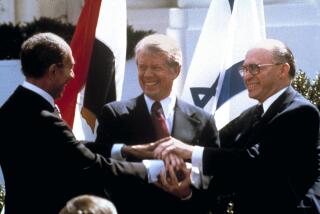Palestinian covenant change may boost peace prospects
- Share via
With its overwhelming vote to revoke all clauses in the Palestinian National Covenant calling for Israel’s destruction, the Palestine National Council has given Yasser Arafat what he asked for and Israeli Prime Minister Shimon Peres what he insisted he must have to continue the peace process. Or so it seems.
The council, which for decades has functioned in its rare meetings as a Palestinian parliament-in-exile, chose an oblique approach to purging the covenant of language denying Israel’s legitimacy and demanding its destruction through armed struggle. It simply agreed to revoke the articles “that contradict” the 1993 mutual recognition agreement between Israel and the PLO and ordered a new charter drawn up. That absence of specificity worries some Israelis; by not listing what hostile references will be expunged, it leaves open the possibility that some will be retained. Most Israelis, however, seem ready to welcome the Palestinian action as a historic step away from confrontation and toward further good-faith efforts to negotiate peace.
In a politically risky reciprocal gesture, Israel’s governing Labor Party voted after the Palestinian action to drop from its election platform what has become a standard expression of opposition to the establishment of a Palestinian state. That is not the same thing as a statement that Labor is ready to accept a Palestinian state, though it stops barely short of such an announcement. Peres told his party that the current arrangement in the Gaza Strip and West Bank of semi-autonomy for the Palestinians “cannot remain.” Israel’s national elections are now little more than four weeks away. Opinion polls indicate the contest between Labor and its chief opponent, Likud, will be close. In effect, as every Israeli understands, the election will be a referendum on the peace process: on what it has achieved so far, on where Israelis are prepared to see it lead. The Labor Party now seems to have signaled unambiguously that if negotiations are successful they will in time result in the birth of an independent Palestinian state. That prospect continues to be vehemently opposed by Likud and other parties on the right.
Certainly the Palestinian charter revision, which is expected to be completed in six months, removes one of the major impediments to potential progress. Written and revised in the 1960s, the National Covenant was a document of its time, filled with revolutionary rhetoric, un- compromising in its territorial claim over all of historical Palestine, unyielding in rejecting any political compromises with Israel, insistent that Palestinian objectives could be achieved only through the barrel of a gun.
Next week Israeli and Palestinian negotiators are to begin a projected three or more years of talks on the ultimate status of the West Bank and Gaza. It’s in these talks that the question of Palestinian statehood is supposed to be dealt with, as well as the future of 140,000 Israeli settlers in the territories, final boundaries and the status of Jerusalem. If Labor remains in office after the May 29 elections, the talks will go on. If Likud is chosen to form the next government, it’s almost certain the peace process will be frozen. This week’s events in Israeli-Palestinian relations have been of major symbolic importance. But history moves ahead quickly. However much has been done so far, the most difficult and divisive issues are still to be addressed and resolved.
More to Read
Sign up for Essential California
The most important California stories and recommendations in your inbox every morning.
You may occasionally receive promotional content from the Los Angeles Times.













